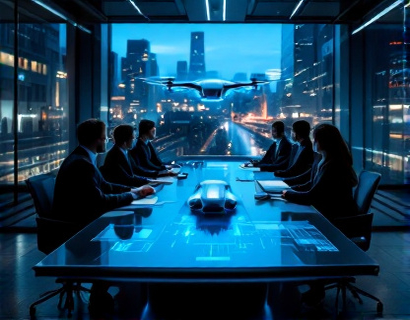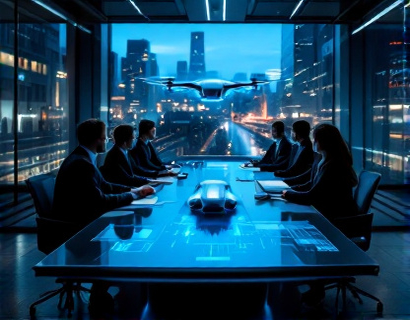AI-Powered Aeronautics: Elevating Businesses with Intelligent Agent Solutions
The aeronautics industry, a cornerstone of global transportation and commerce, is undergoing a transformative shift driven by the integration of artificial intelligence (AI). This evolution is not merely an incremental update but a fundamental reimagining of how businesses operate, make decisions, and innovate. AI-powered solutions are becoming indispensable tools for aeronautics companies aiming to stay competitive and sustainable in a rapidly changing market.
Optimizing Operations through AI
One of the most immediate benefits of AI in aeronautics is the optimization of operations. AI agents can streamline complex processes, from supply chain management to maintenance scheduling. By analyzing vast datasets in real-time, these intelligent agents identify inefficiencies and propose optimized solutions. For instance, AI can predict the most efficient flight paths considering weather conditions, air traffic, and fuel consumption, leading to significant cost savings and reduced environmental impact.
Maintenance is another critical area where AI shines. Predictive maintenance, powered by machine learning algorithms, can forecast equipment failures before they occur. This proactive approach minimizes downtime and extends the lifespan of aeronautical assets. AI agents monitor sensor data from aircraft components, analyzing patterns and anomalies to schedule maintenance activities precisely when needed, rather than on a fixed timeline. This not only saves costs but also enhances safety by ensuring that all components are in optimal condition.
Enhancing Decision-Making with AI Insights
Decision-making in the aeronautics industry is complex and multifaceted, involving numerous stakeholders and variables. AI agents provide a strategic advantage by offering data-driven insights that inform better decisions. These agents can process and analyze vast amounts of data from various sources, including historical performance, market trends, and regulatory changes. By leveraging advanced analytics and machine learning, AI can identify trends, forecast outcomes, and suggest optimal strategies.
For example, in route planning and scheduling, AI can analyze historical flight data, passenger demand, and operational constraints to recommend the most efficient schedules and routes. This level of precision helps airlines maximize revenue while minimizing operational risks. Additionally, AI can assist in risk assessment and management by evaluating potential threats and suggesting mitigation strategies, ensuring that businesses are well-prepared for any scenario.
Tailored Insights for Unique Challenges
The aeronautics sector faces unique challenges that require tailored solutions. AI agents are designed to understand and address these specific needs. For instance, in the maintenance of aircraft, each model and variant has unique requirements and wear patterns. AI can create customized maintenance plans that account for these differences, ensuring that each aircraft receives the exact care it needs. This personalized approach not only improves efficiency but also enhances the overall reliability and safety of the fleet.
Moreover, AI can provide insights into customer behavior and preferences, which is crucial for airlines and other aeronautics businesses. By analyzing data from booking patterns, customer feedback, and social media, AI agents can identify trends and preferences, enabling businesses to tailor their services and marketing strategies effectively. This customer-centric approach fosters loyalty and drives revenue growth.
Case Study: AI in Flight Operations
A notable example of AI in flight operations is the use of AI-powered dispatch systems. These systems use machine learning to optimize flight dispatch decisions, considering factors such as weather, air traffic, and aircraft performance. A leading airline implemented an AI dispatch system that reduced flight delays by 20% and decreased fuel consumption by 15%. This not only improved operational efficiency but also enhanced the customer experience by ensuring more reliable flight schedules.
Another case involves the use of AI in air traffic management. AI agents can process real-time data from multiple sources, including radar, weather reports, and aircraft communications, to optimize airspace usage. This leads to smoother traffic flow, reduced congestion, and lower emissions. For instance, an AI system in a major airport hub successfully managed a 10% increase in traffic without any increase in delays, demonstrating the transformative potential of AI in aeronautics.
Driving Innovation through AI
Beyond operational efficiency and decision-making, AI is a catalyst for innovation in the aeronautics industry. AI-driven research and development can lead to breakthroughs in aircraft design, materials, and propulsion systems. For example, AI algorithms can simulate and test thousands of design variations in a fraction of the time it would take traditional methods, accelerating the development of more efficient and sustainable aircraft.
Material science is another area where AI is making significant contributions. AI can analyze vast datasets to identify new materials with superior properties, such as lighter weight and higher strength. This can lead to the development of aircraft that consume less fuel and have a smaller environmental footprint. Additionally, AI can optimize manufacturing processes, reducing waste and improving quality control.
Sustainability and AI
Sustainability is a critical concern for the aeronautics industry, and AI plays a pivotal role in addressing environmental challenges. AI can optimize flight routes to minimize fuel consumption and reduce carbon emissions. It can also monitor and manage the lifecycle of aircraft components, ensuring that maintenance and replacement activities are performed in an environmentally friendly manner. Furthermore, AI can assist in the development of alternative fuels and propulsion systems, contributing to the industry's goal of achieving net-zero emissions.
A specific initiative involves using AI to optimize ground operations at airports. By streamlining processes such as baggage handling and passenger check-in, AI reduces the energy consumption and carbon footprint of airport operations. This holistic approach to sustainability ensures that the aeronautics industry can grow while minimizing its environmental impact.
Building AI Capabilities within Aeronautics Businesses
To fully leverage the benefits of AI, aeronautics businesses must invest in building robust AI capabilities. This involves not only adopting AI technologies but also developing a culture of innovation and data-driven decision-making. Here are some key steps businesses can take:
- Invest in Data Infrastructure: High-quality data is the foundation of AI. Businesses should invest in robust data collection, storage, and management systems to ensure that AI agents have access to accurate and comprehensive data.
- Develop AI Expertise: Building an in-house team of AI experts or partnering with AI consultants can help businesses develop and implement AI solutions tailored to their specific needs. Continuous training and upskilling of employees are essential to stay ahead in this rapidly evolving field.
- Foster a Culture of Innovation: Encouraging a culture where experimentation and learning from failures are valued can drive innovation. Businesses should create environments where employees are empowered to explore new ideas and collaborate across departments.
- Emphasize Ethical AI: As AI becomes more integrated into operations, ensuring ethical use is crucial. Businesses should establish clear guidelines and frameworks to address issues such as data privacy, bias, and transparency.
By taking these steps, aeronautics businesses can harness the full potential of AI, driving sustainable growth and maintaining a competitive edge in the market.
Conclusion
The integration of AI in the aeronautics industry represents a paradigm shift, offering unprecedented opportunities for optimization, innovation, and sustainability. AI-powered agents streamline operations, enhance decision-making, and provide tailored insights that address the unique challenges of the sector. As the industry continues to evolve, embracing AI will be essential for businesses aiming to thrive in a dynamic and competitive landscape. By investing in AI capabilities and fostering a culture of innovation, aeronautics companies can not only improve their operations but also contribute to a more sustainable future for global transportation.










































